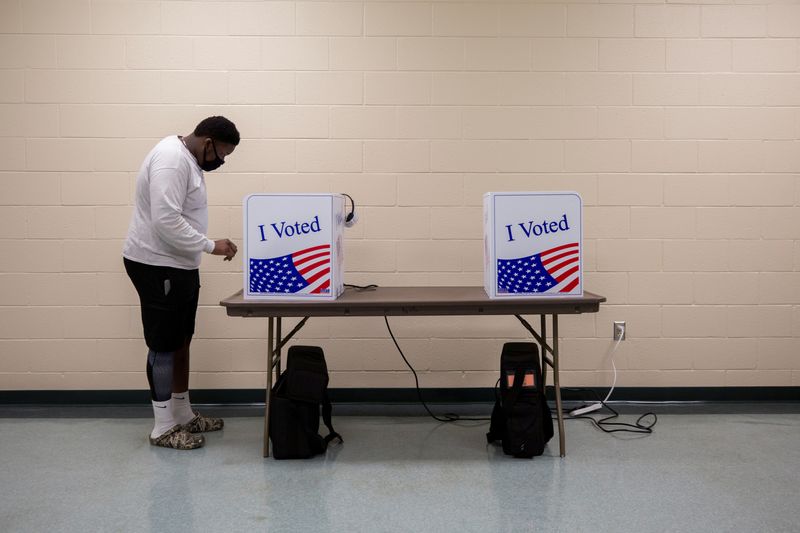By Ann Saphir and Howard Schneider
(Reuters) - When accountants at the federal Bureau of Economic Analysis release the latest U.S. gross domestic product report on Thursday, it may be the most fought-over piece of economic data since the measure of broad productive output came into common use in the 1940s.
Republicans will point to the record-shattering scorecard as evidence that President Donald Trump is working miracles in getting the U.S. economy back on its feet from the drubbing delivered by the COVID-19 pandemic; Democrats backing their party's challenger Joe Biden will counter it shows Trump is bungling the country's future.
GRAPHIC: A rebound, not yet a recovery - https://graphics.reuters.com/USA-ECONOMY/GDP/jbyprxbnype/chart.png
It's already happening.
The Trump campaign in recent days briefly ran Facebook (NASDAQ:FB) ads that tout the unreleased GDP numbers, pre-loading them into Facebook's system ahead of the social media company's Tuesday deadline for new election ads. The strategy gives the campaign the option to use the ads through the rest of the election period.
Some ads celebrated the 'BEST GDP NUMBERS IN HISTORY.' Others said 'GROWTH in the third QUARTER was MORE than double the previous RECORD.'
Not so fast, said Biden campaign spokesman Andrew Bates. "Because of Donald Trump's continuing, inexplicable refusal to buckle down and take the pandemic seriously - as well as his prioritization of costing millions their healthcare over delivering badly needed COVID relief funds - our economy is stalling out right now as layoffs rise and infections surge," he told Reuters.
No one disputes that the economy will show record growth in the third quarter as the extraordinary fiscal package passed this spring gave households and those who lost work extra spending money and covered payroll and other expenses for tens of thousands of businesses.
Lawmakers have yet to pass any more relief, however, and economists estimate those funds are largely gone. Meanwhile, other measures of output, including hours worked, show momentum already slowing.
DO THE MATH
Voters with just a week to go before the Nov. 3 presidential election will need to sort it through for themselves, and the numbers at issue will be unprecedented and require some interpretation.
The only reason, for example, that estimates for the rebound in growth from July through September are so huge is that the drop that came over the two preceding quarters was even bigger. In the space of less than six months, the pandemic turned what had been a $21.7 trillion economy into a $19.5 trillion one.
With that as the starting point, here is some of the math:
An influential model at the Atlanta Fed estimates that in July, August and September the U.S. economy grew at a 37% annualized pace. That's a record by a long way.
It also comes after a record drop in the second quarter, of about 31.4%, annualized. At a glance, it appears that the rebound was larger than the drop - but it actually still leaves the economy in a massive hole compared with where it was before.
All told, if the Atlanta Fed's third-quarter estimate holds true, the economy will have regained about 71% of that nearly $2.2 trillion in output lost this year as the coronavirus pandemic forced consumers to stay home and businesses to shutter.
That leaves output still some $646 billion short of where it began 2020.
For comparison, during the worst stretch of the Great Recession, the economy shrank about $450 billion.
So in fact, the report will show the U.S. economy has never done better over any three-month period of its modern history. But it will also illustrate how deeply in the hole it is compared with before the crisis and the last time the U.S. economy was in a severe downturn.

And now, with coronavirus cases continuing their surge, it will be one more piece of data that voters will want to weigh as they decide whether Trump or Biden is best placed to lever the rebound into a full recovery.
